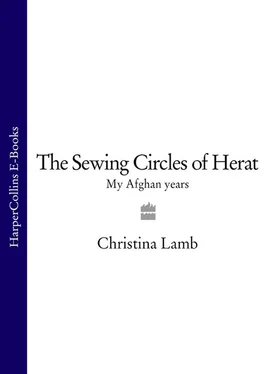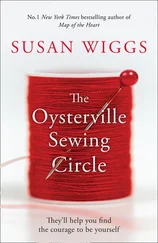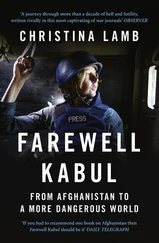Khalil said he sometimes saw Osama bin Laden at Mullah Omar’s house, arriving in a black Land Cruiser with tinted windows, usually in a convoy of seven or eight cars at a time. ‘His bodyguards were all very tall people, Sudanese I think, with curly hair and all with wireless sets and earpieces like those American bodyguards. Sometimes I went to Mullah Omar’s house in Uruzgan when they went hunting for birds or deer together or fishing with dynamite.’
The more he saw of them together the more he became convinced that the Taliban were not really in control. ‘We laughed when we heard the Americans asking Mullah Omar to hand over Osama bin Laden,’ he said. ‘The Americans are crazy. Afghanistan is not a state sponsoring terrorism but a terrorist-sponsored state. It is only Osama bin Laden that can hand over Mullah Omar not vice versa.’
During his time in the Taliban, Khalil had attended two Arab-run training camps, one in Jari Dasht, the Yellow Desert, four hours from Helmand, an area with its own airstrip where Arab sheikhs used to go hunting, and one near Herat. ‘We were taught by Pakistani military trainers how to shoot exact targets and how to move along the ground in the front-line,’ he said. They were also told that if they died while fighting under the white flag of the Taliban, they along with seventy-two members of their families would go to paradise. They were also given blank marriage certificates signed by a mullah and encouraged to ‘take wives’ during battle, basically a licence to rape.
Being ordered to the front-line was to provide Khalil’s chance for escape: ‘We were sixty-two friends sent to Bagram, north of Kabul, and our line was attacked by the Northern Alliance and they almost defeated us. Many of my friends were killed and we didn’t know who was fighting whom, there was killing from behind and in front. Our commanders fled in cars leaving us behind so we also escaped, walking all night.
‘I was very afraid of being caught. I got away but then I was stopped by a line of Arabs who demanded to know why we were escaping. For two days we were under their arrest then taken back to the front-line.’
One night he was put on watch and saw a truck of sheep and goats coming through the lines from Northern Alliance territory so he jumped in and got to Kabul and from there back to Kandahar. There he was arrested and put in jail for eight days and interrogated but managed to get out to Quetta through the intervention of some relatives who were high-ranking Taliban members.
Since leaving the Taliban, Khalil had been living back in Quetta with his wife and baby daughter, and was looking for work. Although he insisted that the Taliban had become an organization ‘in name only’, he feared for his life and I wondered why he had taken the enormous risk of speaking to me. ‘I want people to understand,’ he said, shaking his head. ‘I have done terrible things and the only way I can make up for it is to tell the world the truth about these people.’
Kabul, September 24 2001
Respected Mr Jamil Karzai
Salam alay kum
I hope you and the rest of your family will be alright. I received your letter and I informed other female members of ours, Farishta, Najeba, Sadaf and Maryam about your request to write to a lady journalist who writes for the Sunday Telegraph of Britain.
Respected Karzai, we here really appreciate what you do for the new generation of Afghanistan and we are really worried about your life too. Please be careful.
Here is the letter for Miss Christina Lamb.
Dear Christina
Jamil Karzai has written about you that you are a nice kind beautiful and helpful lady and has asked us, specially me to write a letter about our life under the Taliban regime and I hope this will help you outside understand the feelings of an educated Afghan female who must now live under a burqa.
My name is Fatema, this is my real name but please I ask you to use this name of mine Marri, as what we are doing is dangerous. I’m thirty years old and live in a three-roomed flat with my family on a big estate, it’s called Microrayon. I was born here in Kabul and I graduated from the twelfth class of Hishai Durrani High School, our biggest girls’ school. I speak Dari, Pashto and English. I think you are surprised I know English but my father was a diplomat and my mother an English teacher. My mother went to university in India. So don’t worry.
I know from our friend that you have a kind husband and a beautiful son and you travel the world reporting and meeting people. I dream of a life like that. It’s funny we live under the same small sky yet it seems we live 500 years apart.
You see us now in our burqas like strange insects in the dust, our heads down, but it wasn’t always this way. I do not remember much before the Russian invasion as I was only eight when they came and I felt bad then when I saw the soldiers with their white faces and hair because my parents said they had made slaves of us but even at that time we still went to school. Women worked as professors and doctors and in government. We went for picnics and parties, wore jeans and short skirts and I thought I would go to university like my mother and work for my living.
I know in the villages many schools had been destroyed in the war but here in Kabul we were lucky. Only when the Taliban came were all the girls’ schools and university closed. When the mujaheddin came to Kabul my school was closed for a year because of all the fighting which was very bad particularly here in Microrayon and we were the first line of battle, but then I finished school and became a teacher. I particularly liked science and wanted to go to university to study science but there was no money because my father had lost his job.
When the Taliban came to Kabul, it was September 1996, they told us all to stay at home. They announced it on the radio just like they announced we all had to wear burqas. I had never worn one before, they were something from the village, and it was like not being able to breathe or see, just seeing in front through that small square like a cage, and in the summer it is so hot and the sun blinds you. I fell over twice the first day.
In our house behind all the burqas and shalwar kamiz is a red silk party dress, my mother’s from the time when the king was in power and my father in the foreign ministry. Sometimes I hold it up against me and imagine dancing but it is a lost world. Now we must wear clothes that make us invisible and cannot even wear heels. One of my friends was beaten with cable for wearing white shoes because the Taliban said, ‘how dare you wear the colour of our flag’, and another because they said they could hear her shoes click on the pavement.
You might think we women are doing nothing but my friends and I struggle for the rights of Afghan women working secretly here for the Afghan Women’s League, trying to educate our women and young girls. Some of our members make nan bread and distribute it to widows, there are so many widows from this long war, you see them in all streets in the city begging in their torn clothes but the Taliban beat them and say they are not allowed out without mahram, that’s what we call men relatives like a husband or father.
My sister and I hold secret English and science classes in our house. It is hard as all the time we fear someone might report us and we cannot get books. Our students pay a little and we use it for firewood to keep warm. We do not even have a blackboard. We tell them do not bring bags and sometimes we stop for weeks because we have heard the Taliban are onto us. We thought about contacting an NGO but we are worried the Taliban would find out. Some other schools have been found and the teachers beaten.
Читать дальше












